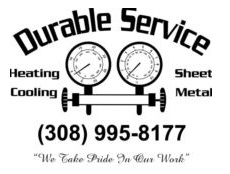
If you’re questioning whether your Holdrege house has unhealthy indoor air quality (IAQ), it likely does.
We are indoors a lot. In reality, we’re in a building up to 90% of the time, according to the U.S. Environmental Protection Agency. And the air inside homes could be 2–5 times more polluted than outdoors, which can create long-term health issues.
Most Common Sources of Poor IAQ
We’ve put together a list of the most frequent sources of inferior IAQ, the issues they make and how you can fix these indoor air pollutants. If you’re troubled by the air inside your home, we recommend chatting with a expert like Durable Service about which products are best for your family.
Volatile Organic Compounds
Volatile organic compounds, or VOCs, are fumes released by everyday household things.
They’re found in paint and stains along with:
- Furniture
- Carpet
- Building materials
- Cleaning products
- Cosmetics
- Air fresheners
- Candles
When these vapors accumulate indoors, they can irritate your eyes, nose and throat. They might also cause headaches and nausea. Regardless of whether your home is in a rural or industrial area, an EPA study found indoor levels of these chemicals can be 2–5 times greater than the air outdoors.
Always adhere to the manufacturer’s guidelines when applying paint or spraying cleaning products. Unlatching a window can help vapors disperse faster.
Air purification systems can also help. This system partners with your heating and cooling unit to freshen indoor air. When hunting for one, ensure it’s specifically created to wipe out VOCs.
Dust and Pet Dander
Dust and pet dander can irritate health problems like asthma and allergies, especially when it continuously gets moved by your home’s comfort unit. While you can vacuum more routinely and get an improved air filter, an air filtration system may be a better fit.
This equipment hooks to your comfort equipment to provide strong filtration. Some kinds provide hospital-level filtration for getting rid of particles and bioaerosols.
Persistent Odors
Modern houses are securely sealed to enhance energy efficiency. While this is great for your utility expenses, it’s not ideal for your IAQ.
Stuffy odors can stick around for a greater amount of time because your residence is pulling in less fresh air. Because keeping your windows open all the time isn’t doable, here are two methods you can make your indoor air smell fresher.
An air purification system is installed in your ductwork to neutralize odors before they recirculate. Look for one with a carbon filter and the capability to break down damaging VOCs. These units can also help keep your family healthy by eliminating most bacteria and ordinary allergy triggers like pollen and mold spores.
A ventilation system takes out stale indoor air and exchanges it with clean outdoor air. There are two types of systems (heat recovery and energy recovery), so call our professionals for more details on which solution is right for your house.
Uneven Humidity
It’s critical your home’s humidity keeps even. Air that has too much moisture can lead to mold, while dry air can cause respiratory symptoms.
Our technicians suggest 40–50% for top comfort. To keep yours in balance, think about getting a whole-home humidifier or whole-home dehumidifier with your comfort equipment.
In place of having to lug a humidifier from room to room, this equipment delivers even humidity throughout your house.
Carbon Monoxide
Carbon monoxide is colorless gas you can’t smell. It occurs when there’s insufficient combustion in fuel-burning equipment, like gas heating systems, water heaters or fireplaces.
It produces a severe health risk. In little levels, it can cause flu-like sickness like headaches and nausea. It can be fatal in big concentrations.
We recommend annual furnace maintenance to double-check your system is working smoothly. This job allows our techs to discover problems before they start, including malfunctions that can lead to carbon monoxide leaks.
The best method to keep your residence free of carbon monoxide is to get detectors. These alarms must be on each floor close to bedrooms and living rooms.
Better Your House’s Air Quality with the Durable Service Experts
Know that your residence has bad air quality but not sure how to enhance it? Or unsure which product is right for you? Give our friendly HVAC experts a call at 308-995-8177 or contact us online now. With free estimates and pro assistance, we’ll help you find the best option for your family and budget.

